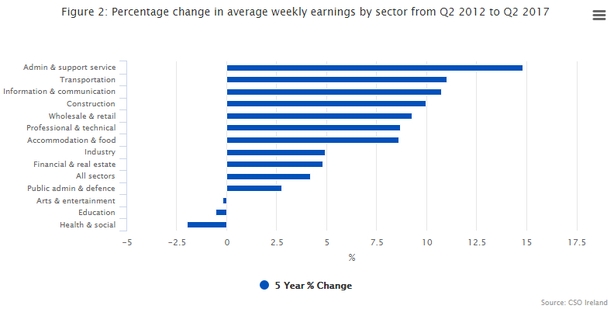Average weekly earnings increased by €15.63 (+2.2%) to €722.65 in the second quarter of the year, when compared with the same period in 2016.
Central Statistics Office data also show average hourly earnings rose by 1.6% to €22.34 over the same corresponding timeframe.
People worked an average of 32.3 paid hours per week between April and June, a slight rise on Q2 in 2016.
The highest average weekly earnings of €1,084.53 were in the ‘information and communication’ sector, followed by the ‘financial, insurance and real estate’ sector at €1,029.88.
At the other end of the scale, the lowest average weekly earnings were €339.38 in the ‘accommodation and food services’ sector, and €468.70 in the ‘arts, entertainment, recreation and other service activities’ sector.

Average weekly earnings increased by 3.3% across the public sector in the year to June, rising from €908.03 to €938.25.
This earnings growth in the public sector can be partly attributed to wage restoration from April 2017, Garda overtime payments, and lower than usual average earnings in Q2 2016, due to the inclusion of temporary Census field staff.
When Census field workers are excluded from Q2 2016 figures, average weekly earnings in the public sector were 2.4% higher in the year to June.
Commenting on the figures, IMPACT trade union said "it’s encouraging to see modest pay recovery happening across the economy, although pay adjustments are still lagging behind economic growth projections for 2017 as measured by both GDP and GNP.
"Today’s CSO release makes it clear that the difference between pay recovery in the public and private sectors is almost entirely due to a statistical quirk caused by the employment of temporary census staff in 2016. This deflated the public service figures in 2016, rather than inflating them in 2017."

